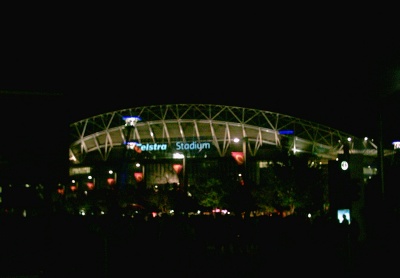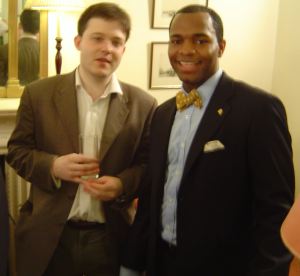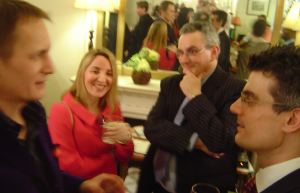We are developing the social individualist meta-context for the future. From the very serious to the extremely frivolous... lets see what is on the mind of the Samizdata people.
Samizdata, derived from Samizdat /n. - a system of clandestine publication of banned literature in the USSR [Russ.,= self-publishing house]
|
I think I smell another variant of the real-work-unreal-work fallacy. You know the one I mean. It said, a few centuries ago, that making real, edible food was real work, but fiddling about with bits of metal was unreal. Then when fiddling about with metal starting to move to faraway places, fiddling about with metal (especially if it was heavy enough or hot enough to do you serious damage if you mishandled it) was real, but shovelling paper this way and that was unreal.
But now, hear this, a comment from Neal of Margate on a BBC report about the rise in Britain of working at home, made possible by the rise of broadband. I have already commented on this report at my Education Blog, because it will surely make home education easier, but that is another story. Here is Neal of Margate:
This infuriating subject is back, is it? Please do tell me, how should dustmen work from home? Street sweepers, can they work from home? Factory workers? District nurses? Casualty department staff?
The only people who can work from home are those who do an unnecessary job. Can surgeons work from home? Ambulance drivers? Firemen? If you can work from home full time, you have a pointless job.
Maybe not, yet. (Although, give it a century or two …) But an offshore banker can work for the whole world from a West Indian island, on the beach, let alone at his mere home. But according to Neal, pure information manipulation counts for nothing. It has to be combined with, you know, doing something.
This Neal character has just got to be rabidly anti-capitalist. You couldn’t believe in the benefits of markets and of the division of labour and believe stuff as daft as this.
So, it is good to know that something as seemingly benign as some people being able to get a day’s work done without spending a couple of hours of what is left of the day stuck in traffic jams or crammed into metal tubes makes this particular anti-capitalist’s brain hurt.
The Home Secretary, David Blunkett, has once again pledged to introduce a compulsory national ID card scheme saying that ID cards were an essential tool in the fight against global warming.
Speaking to the BBC today, Mr. Blunkett denied that ID cards were merely a fetish and emphasised that they were a much-needed response to a fast changing world:
“Everbody understands the need to take serious steps to tackle the growing menace of global warming but we cannot even begin to do this without a proper national ID card system”.
Mr. Blunkett was also dismissive of the scheme’s critics:
“These so-called civil libertarians who try to suggest that there is no link between ID cards and global warming are simply dangerous and deluded. They are terrorists in all but name.”
According to a recent opinion poll, every single person in the UK has pledged that they will murder their own children and then kill themselves horribly unless the government issues them with a biometric ID card immediately.
The state of New South Wales, Australia (which contains the city of Sydney) is in some ways irritating. If anything, the state government is even worse than the government of the United Kingdom in attempting to over-regulate every aspect of its citizens lives. Carrying weapons of any kind is completely illegal. (I like to carry a Swiss Army Knife, and technically doing even that is contrary to the law). If you want to go into a supermarket and buy a bottle of wine, or a newspaper, or anything but the mildest of medicines, there are laws preventing you from doing so. (Liquor stores, newsagents, and pharmacies are all granted local monopolies). And heaven forbid if you want to go to a quite cozy bar for a drink. But there are some compensations, as fellow Samizdatista Scott Wickstein and I discovered yesterday evening.
Scott and I ventured to what is now named “Telstra Stadium”, which was the main stadium for the 2000 Sydney Olympics, which is now sponsored by a telephone company. (More than 50% of the shares of said telephone company belong to the Australian federal government, but I digress….). It was a beautiful evening, and after a beer or two in a nearby bar, we headed for the stadium.
 The game was an Australian rules football game between the Sydney Swans and the Melbourne Demons. The atmosphere inside the ground was extraordinarily pleasant. Unlike in certain sports I could mention, the home and away supporters were not segregated from each other, and the atmosphere was enormously pleasant, however fanatical were the Melbourne supporters. (And boy, are the Melburnians fanatical). With 18 players on each side, seven umpires, and certain strange figures called “runners”, who carry messages from the coaches to the players while the game is going on there are as many as 45 people on the field at once.
The game is lightning fast, and completely incomprehensible to foreigners. While many Australians think that Aussie rules football is a matter of life and death, in global terms the game is incredibly insignificant. Both teams could probably be bought for what Roman Abramovich spent to bring Damien Duff to the Chelsea Football Club in London.
As it happened my team, the Swans, ended up losing. But there are some compensations. Sydney people are enormously proud of their lifestyle, which involves going to the beach a lot, eating fine food, relaxing, and simply enjoying what life has to offer. And that applies at football matches as much as anywhere else.
And however many millions Mr Abramovich has spent, I seriously doubt that there is a bar where Chelsea supporters can enjoy oysters together after the game, as there is in Sydney. And even if there is (ha), they are certainly not this reasonably priced. And even if they are that, I am sure they are not freshly shucked.
According to super-rich, property magnate Will Hutton, we are all Europeans now:
There are strong reasons for Britain to want more than a common market like the rest of Europe, and to try, in the process, to create the European public realm we currently lack. We share, despite a multiplicity of languages and histories, the same core values – a belief in the social contract, an adherence to the idea of the importance of the public realm and shared views that capitalism must be fairly run.
Hutton’s Europe: a land of permanent paternalism.
I wonder if Mr. Hutton’s tenants have to tug their forelocks and call him ‘sir’?
Today I bought a great book in a remainder shop. It is a year by year history of London, strong on strange and intriguing events, not heavy with the theorising. Lovely.
It is a blogger’s delight. I have already culled three postings from it – two for here and a ‘how very odd’ posting here.
Here is another fascinatingly odd factoid, entry number six for the year 1729:
WIFE-SELLING IN THE CITY
It was reported that ‘Last Wednesday one Everet, of Fleet Lane sold his wife to one Griffin of Long Lane for 3 shilling bowl of punch; who, we hear, have since complained of having a bad bargain.’
A salutary reminder that ‘Christian’ men could be fairly primitive to Christian women, not so long ago. Many Muslims still are, of course. But if we Christians can mend our ways, they surely can too.
A team from the EU Commission is hotfooting it off to North Korea in the wake of that ‘minor-train-incident-which-never-happened-and-anyway-even-if-it-did-it-was-caused-by-reactionaries‘:
Development spokesperson Jean-Charles Ellermann-Kingombe said on Friday that a representative from the EU’s humanitarian assistance team in North Korea will visit the site late tonight (early morning local time) to assess the situation.
They may have to fly in some emergency directives. But, on to the truly pant-wettingly, hilarious, quote-of-the-week bit:
Asked whether the EU representative would be allowed to get a clear picture of the situation on the ground given the secrecy of the Pyongyang regime and the time elapsed since the accident occurred, Mr Ellermann-Kingombe pointed out that they had been invited by the authorities to visit the site.
“We have no reason to question their intentions”, he said.
And probably no motive either.
St. George’s Day Party at the New Cavendish Club, ergo more drinking and less blogging 
Glenn Reynolds has reported some recent photos purportedly showing flag drapped coffins at Dover Air Force Base are a hoax. According to a NASA headquarters statement, the pictures are actually of the coffins of the Challenger astronauts:
An initial review of the images featured on the Internet site www.thememoryhole.org shows that more than 18 rows of images from Dover Air Force Base in Delaware are actually photographs of honors rendered to Columbia’s seven astronauts.
Apparently a number of news outlets fell for it hook, line and sinker.
Every few days, with this in mind, I trawl through whatever google has to offer under the heading of “education”. Mostly, it is dreary and depressing stuff about how (a) things are terrible, and (b) it is all the fault of those other bastards, or (if it is Africa) (a) things are terrible, and (b) things are terrible. Only when it comes to Chinese people or Indian people is the education news ever very good by the time national newspapers get hold of it, and of course that only depresses other people.
So, this story made a nice change:
The quality of education and behaviour of pupils at Probus Primary School have been praised by Government inspectors.
Ofsted inspectors highlighted children’s good behaviour and attitudes towards learning and the partnership with parents and the local community.
The report notes the improvements made since the last inspection and concludes that achievement is satisfactory overall and standards are rising.
It said: “Probus is providing a sound education for its pupils. There is good teaching through the school. The school is well led and managed and there is a good partnership with parents. There is a good team ethos and members of staff are supportive of each other.
“Pupils are well cared for and those with special educational needs make good progress.”
What this really illustrates is probably only that whereas national newspapers like bad news, local newspapers prefer good news. The national newspaper definition of news is: whatever someone does not want printed. Local newspapers are such that whatever someone does not want printed tends not to get printed, because that someone plus all their employees and friends and relatives add up to a significant slice of the readership. Thus, local newspapers are full of sickeningly satisfactory happenings, where everything went according to plan and everyone was happy and satisfied with the outcome. The news, every time is: our readers are good people, successful people, happy people.
There is occasionally bad news, so bad that its occurrence cannot be concealed, in which case the story is how nobly our readers are coping with the situation, but on the whole, there is simply not enough bad news to go round.
Britain as a whole cranks out enough misery, conflict and personal embarrassment per day to satisfy the nationals, and of course the nationals also have a whole world of misery to contemplate beyond their nation’s borders.
But Truro and Mid Cornwall, the area reported on by the newspaper that supplied this Probus Primary School story, is just too nice a place for all the news to be bad.
Everyone is aware by this time that al Qaeda’s attack on Madrid led to the election of the candidate who promised immediate withdrawal of Spanish forces from the coalition in Iraq. The Spanish electorate are acting like the child who, after getting knocked down by a schoolyard bully, cowers in the hope said bully will stop hitting them and just go away.
Based on this thought, I was going to do a cute ‘appropriate’ modification of the Spanish flag.
To my chagrin, I have discovered the Spanish flag already has a yellow stripe down the middle.
There are times when the newsies reach depths which even I find difficult to fathom. There has been an ongoing debate with the DOD by the lowest of the breed about access to Dover Air Force Base where our war dead make their first stop on home soil.
The DOD says it is being sensitive to the needs of the families; that most do not want the return of their loved ones turned into a ratings carnival for the Evening News.
Personally, if I were a family member and a loved one of mine were being returned, I would expect quiet and dignity. If the DOD ever changes the policy in favour of the paparazzi, family members should consider applying their weapon of choice against the nearest, most expensive cameras.
Kicking a cameraman in the balls could be equally educational to the receiver, even if she doesn’t have them.
Recently, this blog noted the repressive measure by the Irish government to outlaw smoking in pubs and restaurants, even though no-one is either forced to work, drink or eat in these privately owned establishments. When thinking, however, about how to frame the arguments against such bans, it is very easy to just rail against the latest nanny state outrage but not give examples of how the market can cater much more effectively for tobaccophobes instead.
Sticking with the issue of smoking in pubs, consider this. In a market order, different pubs will enforce different rules depending on whether the owners figure that they can get the most business by either banning smoking totally, banning it in part of the building, or by installing smoke extractor machines, or even creating American “cigar-bar” type establishments where smoking is positively encouraged as part of the whole pub experience. The point is, the more choice there is, the more opportunities for those who have different tastes to get along in congenial company without the need for unnecessary wrangling.
This also gives a great example of how private property can and does act as a solvent of potential conflicts, a point which collectivists rarely pause to consider.
It is uncertain how health and safety regulations have encouraged bars and restaurants to change the way they deal with this issue, apart from requiring owners of premises to enforce minimum standards. But the trouble with minimum standards is that businesses have no real incentive to raise standards much higher than such a level because the cost is unlikely to bring a commensurate reward. The paradox is that letting the market work could actually raise standards much higher overall.
As with all such issues, you can be sure that legislators rarely bother to consider the law of unintended consequences when it comes to things like this. plus ca change…
|
Who Are We? The Samizdata people are a bunch of sinister and heavily armed globalist illuminati who seek to infect the entire world with the values of personal liberty and several property. Amongst our many crimes is a sense of humour and the intermittent use of British spelling.
We are also a varied group made up of social individualists, classical liberals, whigs, libertarians, extropians, futurists, ‘Porcupines’, Karl Popper fetishists, recovering neo-conservatives, crazed Ayn Rand worshipers, over-caffeinated Virginia Postrel devotees, witty Frédéric Bastiat wannabes, cypherpunks, minarchists, kritarchists and wild-eyed anarcho-capitalists from Britain, North America, Australia and Europe.
|












